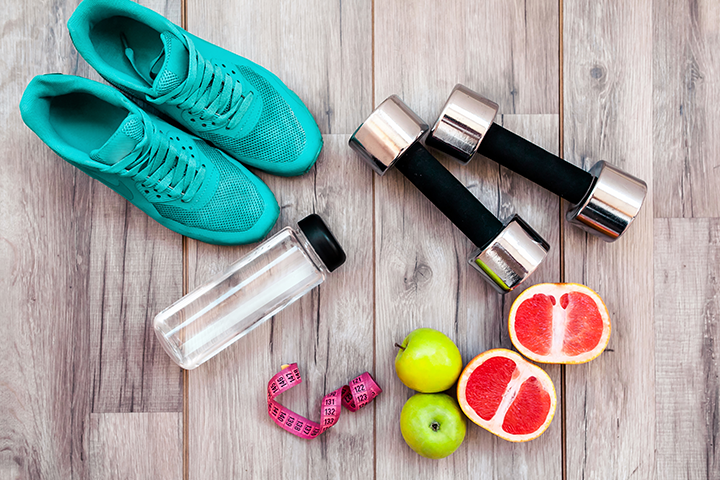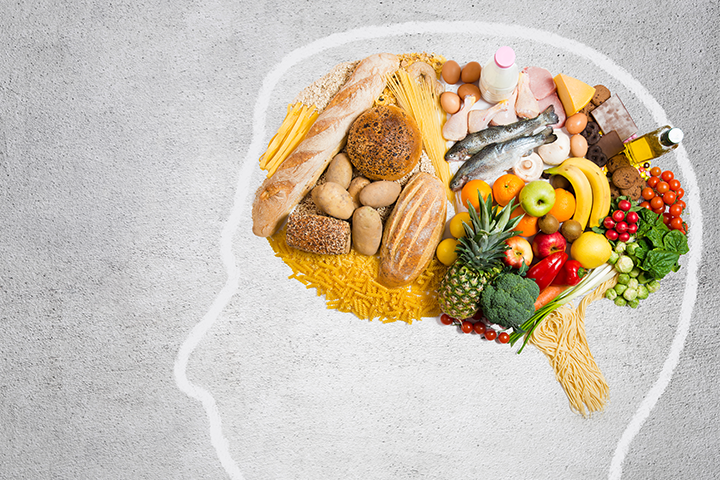Food should be fun and fresh, but it should also be fuel.
The food you eat every day can give you energy. That energy can be long lasting, or fleeting, depending on what you choose.
Choosing food that's high in nutrients and has the right mix of proteins, carbohydrates and fat has been proven to boost your energy. And that energy doesn't just power your body. How and what you eat can also have a dramatic effect on your brain power and mood.
Why do some foods act as fuel?
Most foods are broken down into glucose after we eat them. Glucose is the main type of sugar in your blood.
Your body processes food differently, depending on what it is. Foods with a higher sugar content are simple carbohydrates that release glucose quickly. These include:
white and brown sugar
candy
regular soda
white flour, white bread and white rice
pasta
refined breakfast cereal

If you've ever had a sugar rush, you know how some foods can cause your energy to spike. But that rise is usually followed by a quick crash when blood sugar levels dip.
These kinds of foods are typically not good for you if eaten frequently and in large amounts. They're especially dangerous for diabetics and people with blood sugar issues.
Complex carbohydrates release glucose slowly, which can help you sustain energy over time. These foods tend to be more nutrient rich, so they offer other health benefits. They can also help you to feel fuller longer. They include:
legumes, like lentils, peas, chickpeas and beans
fruits
starchy vegetables, such as sweet potatoes
whole grain bread, rice and pasta
oats
Fueling your brain
Many of the same foods that energize your body can also boost your brainpower. Harvard Health says the best brain foods are the same ones that help protect your heart and circulatory system. They include:
- Green, leafy vegetables like broccoli, kale, spinach and collard greens – Studies show these nutrient-rich veggies may keep your brain sharp. Spinach is especially good for you, with folic acid for brain function and B6 for short-term memory.
- Fatty fish like salmon, canned light tuna and cod – The omega-3 fatty acids and healthy fats have been shown to improve brain function and protect against Alzheimer's disease.
- Berries – Research shows the flavonoids in berries can improve your memory.
- Eggs – Choline in the yolk may enhance memory and cognitive skills.
- Brown Rice – This whole grain is rich in magnesium, which has been shown to improve brain function.
- Dark Chocolate – Treat yourself with something yummy that has caffeine and antioxidants to boost your productivity, enhance focus and make you feel happy.
- Salmon – The Omega-3 fatty acids, iron, vitamins and protein can improve memory, focus and critical thinking.
- Nuts – Almonds have a mood-boosting amino acid, walnuts have brain-boosting Omega-3 fatty acids and vitamins, and cashews have a high magnesium count for improved focus.
- Avocado – You've heard of “good fats," right? That's the great thing about avocados. Those nourishing fats assist blood flow, which is key to a healthy brain. They also have potassium, which helps with high blood pressure.
Fueling your mood
What you eat – and drink – can affect your mood and make a difference in your mental state, says Mental Health America. Nutrients that have been shown to help mood and mental health include:
1. Omega-3 fatty acids – In addition to some fish and nuts, you can find them in:
- chia seeds
- flaxseed
- plant oils like soybean and canola
- some brands of fortified eggs, yogurt, juices, milk and baby formula
2. Folic acid – Folic acid is in:
- vegetables like romaine lettuce, asparagus, Brussels sprouts and broccoli
- beans
- peanuts
- sunflower seeds
- fresh fruits and juices
- liver
- eggs
3. Vitamin B – Find it in:
- salmon
- tofu
- green peas
- beef
- chicken
4. Vitamin D – Get it in:
- mushrooms
- tuna
- cheese
- fortified milk
- fish like tuna and sardines
5. Magnesium – Add to your diet:
- nuts and seeds
- black beans
- peanut butter
6. Tryptophan – Known as the amino acid that makes us sleepy after Thanksgiving turkey, this can also be found in:
- egg whites
- chicken
- cheese
- milk
- nuts and seeds
Fueling your body for exercise
The food you eat — and when — is especially important when working out or doing other physical activities. Giving your body the right fuel can help you perform at your best and keep you safe.
The Academy of Nutrition and Dietetics stresses the importance of eating a healthy breakfast. They also suggest eating a mix of protein and carbohydrates before and two hours after you exercise. Options include:
- eggs and whole grain toast
- peanut butter with an apple
- low-fat Greek yogurt with berries
- oatmeal with low-fat milk and fruit or nuts
- low-sugar protein smoothie
- a sandwich of low-fat meat like turkey or chicken on whole grain bread
- whole grain pasta or brown rice with a lean protein
Get your water in
Don't forget to drink your fluids! Getting enough water is critical for your health. According to the Mayo Clinic, women should drink a minimum of nine cups of fluid a day, and men should drink 12 cups. Here are a few hydration tips:
- You may need more fluids in hot weather or with strenuous exercise.
- Take small, frequent sips of water during workouts to keep your hydration level up.
- Water is best for overall hydration, but sports drinks or fluids with added electrolytes can be helpful when you're exercising or ill.
- Excessive caffeine and alcohol use can dehydrate you. Be sure to up your water intake as needed!
- It's best to stay away from sugary sodas and sweetened fruit drinks that spike your blood sugar and don't offer any nutritional value.
Your doctor can give you a better idea of your ideal fluid intake level and offer suggestions for the best types of fluids for your lifestyle.

Variety is the spice
Fueling your body and brain with the right foods is an important key to getting and staying healthy. But it's also important to vary your diet so you get a wide range of nutrients and don't get bored with a limited diet.
MyPlate's Daily Recommendations lays out the servings you should be eating from each food group depending on your life stage.
Work with your doctor or a nutritionist to determine your optimal calories, and how much you should be eating of each category depending on your health goals.
Resources for TRS-ActiveCare and TRS-Care Standard
No Cost Health Coaching
You can work with a nutritionist, personal trainer or other credentialed health expert – and it's included in your health plan!
Mental Health Resources
Get help with an eating disorder or other mental health condition affecting your weight or health. You can see a therapist, psychiatrist or other mental health professional in person or virtually.
Fitness Program
Get access to a nationwide network of workout facilities at discounted prices with the Fitness Program. You can also choose digital options and pay-as-you-go studio classes like yoga and Pilates. The Fitness Program is available to you and your covered dependents age 16 and older.
Well onTarget®
Well onTarget® offers self-management programs, tips and resources to help you on your weight loss journey. Digital interactive courses and learning activities can help you with healthy eating and lifestyle changes.
Personal Health Guide
Talk to a Personal Health Guide, 24/7. Call 1-866-355-5999 or chat in the BCBSTX App. A PHG can help you with your wellness needs, find you a provider, make an appointment, get claims information, do cost comparisons, and more.
Resources for TRS-Care Medicare
Real Appeal®
Real Appeal® is a healthy lifestyle program proven to help you achieve lifelong results by focusing on your diet and physical activity, one step at a time. It includes:
- Online group sessions (and one-on-one sessions for those that qualify) led by a coach;
- A health coach who will partner with you and guide you to a healthier, happier you;
- A community of members to keep you motivated;
- Goal-setting tools, trackers and weekly content to help you learn and stay engaged; and
- A free Success Kit with all the tools you need delivered right to your door.
Call Real Appeal at 1-844-924-7325, TTY 711, to get started!
Mental Health Virtual Visits
Get help with an eating disorder or other mental health condition affecting your weight or health. Connect with a mental health expert on your computer, tablet or smartphone. Visit VirtualVisitsMentalHealth.uhc.com to select a health care provider. They can evaluate and treat conditions such as depression and anxiety, and address substance use concerns.